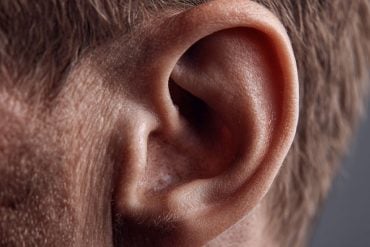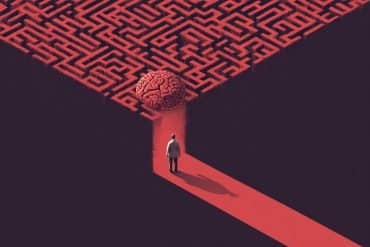Summary: A new study reports people who sit down too much during middle to older age show signs of thinning in the medial temporal cortex, an area of the brain associated with the formation of new memories.
Source: UCLA.
Sitting too much is linked to changes in a section of the brain that is critical for memory, according to a preliminary study by UCLA researchers of middle-aged and older adults.
Studies show that too much sitting, like smoking, increases the risk of heart disease, diabetes and premature death. Researchers at UCLA wanted to see how sedentary behavior influences brain health, especially regions of the brain that are critical to memory formation.
METHOD
UCLA researchers recruited 35 people ages 45 to 75 and asked about their physical activity levels and the average number of hours per day they spent sitting over the previous week. Each person had a high-resolution MRI scan, which provides a detailed look at the medial temporal lobe, or MTL, a brain region involved in the formation of new memories.
The researchers found that sedentary behavior is a significant predictor of thinning of the MTL and that physical activity, even at high levels, is insufficient to offset the harmful effects of sitting for extended periods.
This study does not prove that too much sitting causes thinner brain structures, but instead that more hours spent sitting are associated with thinner regions, researchers said. In addition, the researchers focused on the hours spent sitting, but did not ask participants if they took breaks during this time.

The researchers next hope to follow a group of people for a longer duration to determine if sitting causes the thinning and what role gender, race, and weight might play in brain health related to sitting.
IMPACT
MTL thinning can be a precursor to cognitive decline and dementia in middle-aged and older adults. Reducing sedentary behavior may be a possible target for interventions designed to improve brain health in people at risk for Alzheimer’s disease, researchers said.
Prabha Siddarth, a biostatistician at the Semel Institute for Neuroscience and Human Behavior at UCLA, is the study’s first author. Dr. David Merrill, a geriatric psychiatrist and assistant clinical professor of psychiatry and biobehavioral sciences at UCLA, is the study’s senior author. The other authors are Alison Burggren and Dr. Gary Small, both of UCLA, and Harris Eyre of the University of Adelaide, Australia.
Funding: The study was supported by grants from various funders including the National Institutes of Health, the U.S. Department of Energy and the McLoughlin Gift Fund for Cognitive Health.
Source: Leigh Hopper – UCLA
Publisher: Organized by NeuroscienceNews.com.
Image Source: NeuroscienceNews.com image is in the public domain.
Original Research: Open access research for “Sedentary behavior associated with reduced medial temporal lobe thickness in middle-aged and older adults” by Prabha Siddarth, Alison C. Burggren, Harris A. Eyre, Gary W. Small, and David A. Merrill in PLOS ONE. Published April 12 2018,
doi:10.1371/journal.pone.0195549
[cbtabs][cbtab title=”MLA”]UCLA “Sitting is Bad for Your Brain, Not Just Your Heart or Metabolism.” NeuroscienceNews. NeuroscienceNews, 12 April 2018.
<https://neurosciencenews.com/sitting-brain-health-8774/>.[/cbtab][cbtab title=”APA”]UCLA (2018, April 12). Sitting is Bad for Your Brain, Not Just Your Heart or Metabolism. NeuroscienceNews. Retrieved April 12, 2018 from https://neurosciencenews.com/sitting-brain-health-8774/[/cbtab][cbtab title=”Chicago”]UCLA “Sitting is Bad for Your Brain, Not Just Your Heart or Metabolism.” https://neurosciencenews.com/sitting-brain-health-8774/ (accessed April 12, 2018).[/cbtab][/cbtabs]
Abstract
Sedentary behavior associated with reduced medial temporal lobe thickness in middle-aged and older adults
Atrophy of the medial temporal lobe (MTL) occurs with aging, resulting in impaired episodic memory. Aerobic fitness is positively correlated with total hippocampal volume, a heavily studied memory-critical region within the MTL. However, research on associations between sedentary behavior and MTL subregion integrity is limited. Here we explore associations between thickness of the MTL and its subregions (namely CA1, CA23DG, fusiform gyrus, subiculum, parahippocampal, perirhinal and entorhinal cortex,), physical activity, and sedentary behavior. We assessed 35 non-demented middle-aged and older adults (25 women, 10 men; 45–75 years) using the International Physical Activity Questionnaire for older adults, which quantifies physical activity levels in MET-equivalent units and asks about the average number of hours spent sitting per day. All participants had high resolution MRI scans performed on a Siemens Allegra 3T MRI scanner, which allows for detailed investigation of the MTL. Controlling for age, total MTL thickness correlated inversely with hours of sitting/day (r = -0.37, p = 0.03). In MTL subregion analysis, parahippocampal (r = -0.45, p = 0.007), entorhinal (r = -0.33, p = 0.05) cortical and subiculum (r = -0.36, p = .04) thicknesses correlated inversely with hours of sitting/day. No significant correlations were observed between physical activity levels and MTL thickness. Though preliminary, our results suggest that more sedentary non-demented individuals have less MTL thickness. Future studies should include longitudinal analyses and explore mechanisms, as well as the efficacy of decreasing sedentary behaviors to reverse this association.






